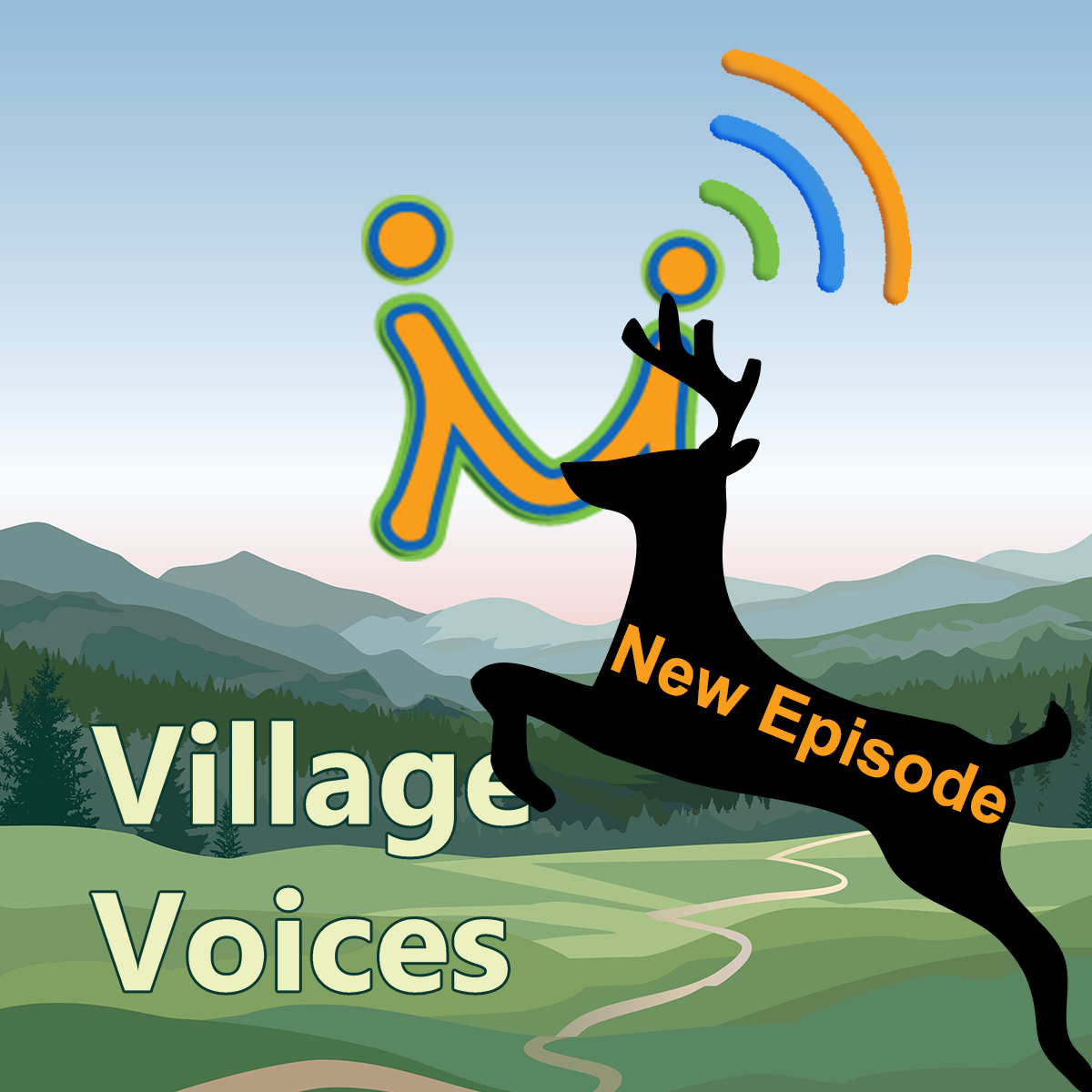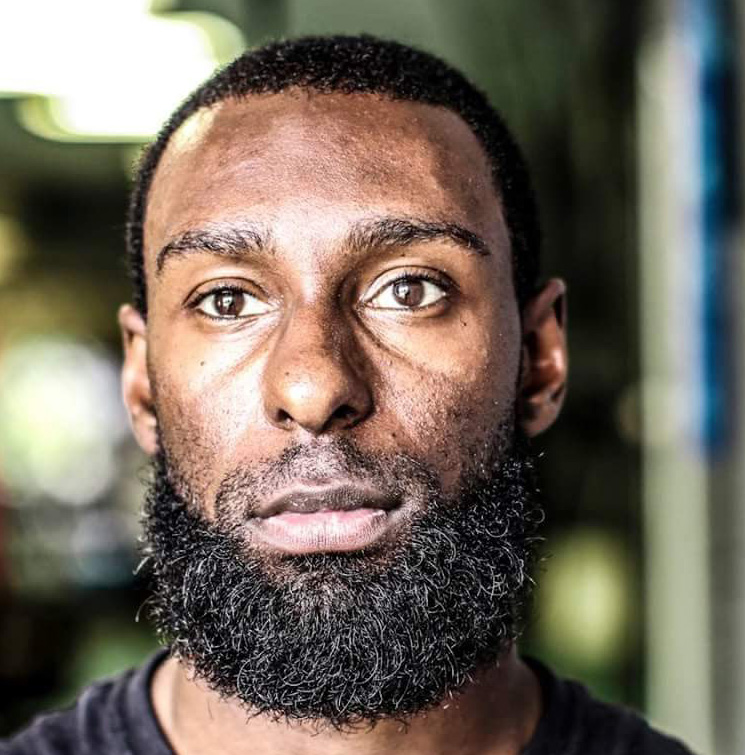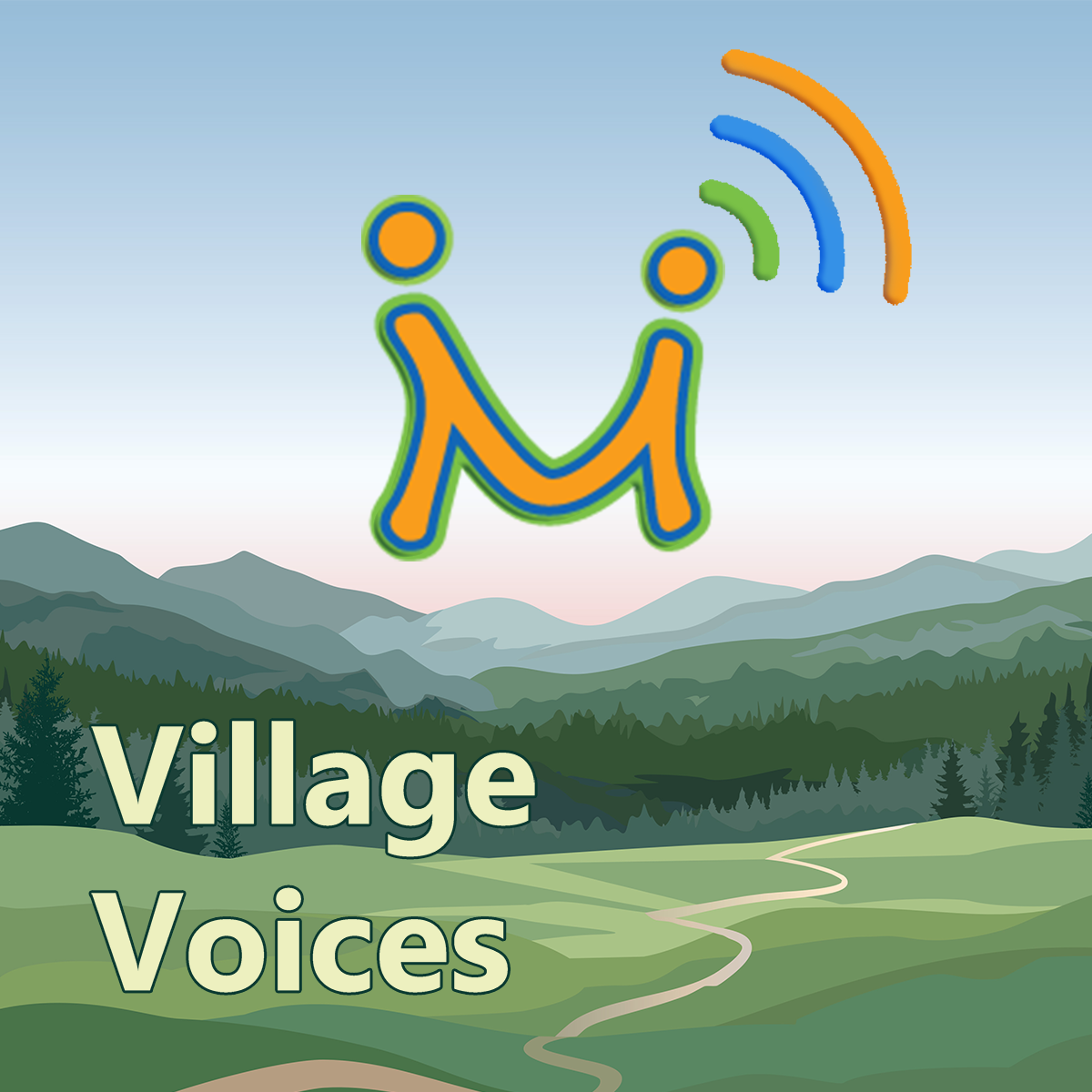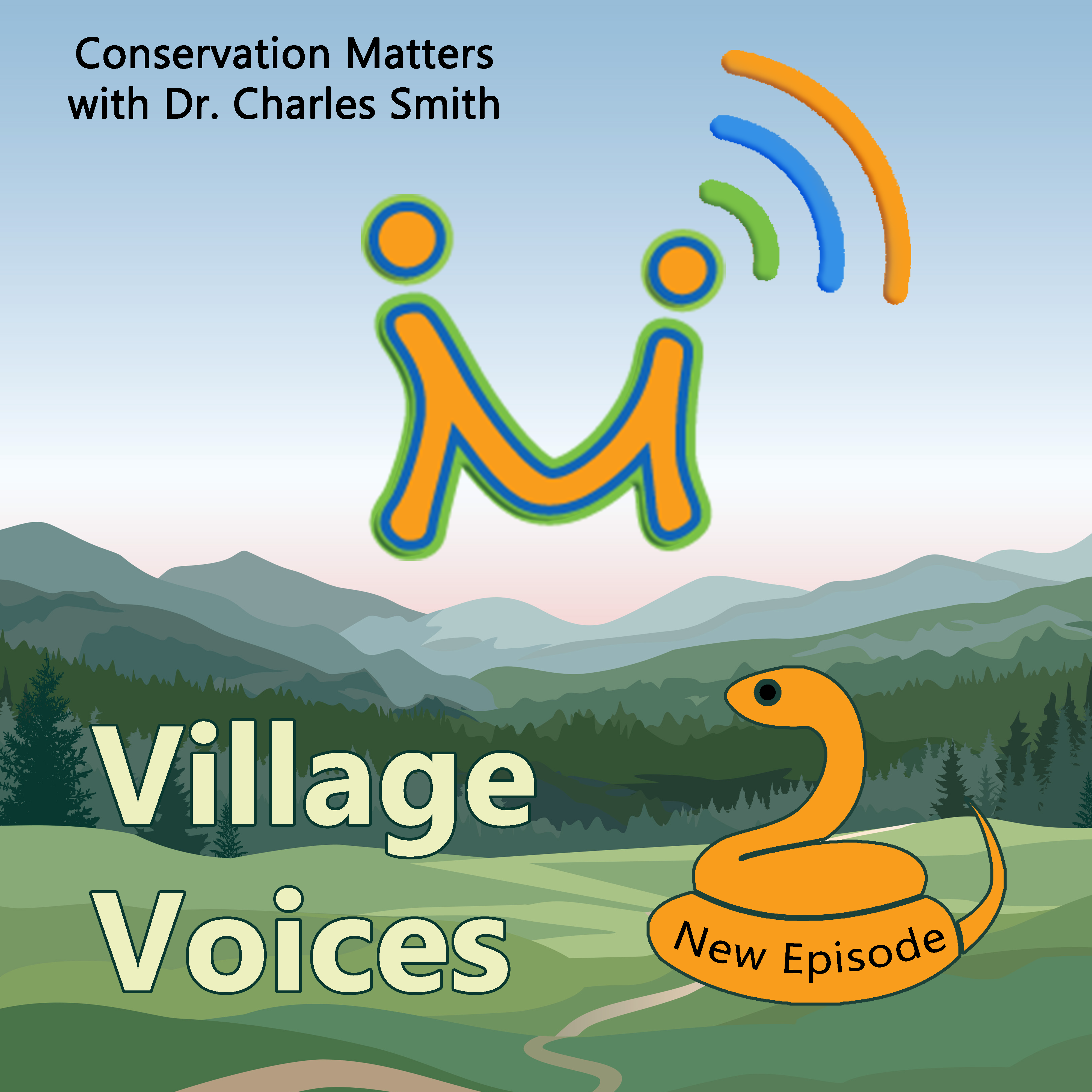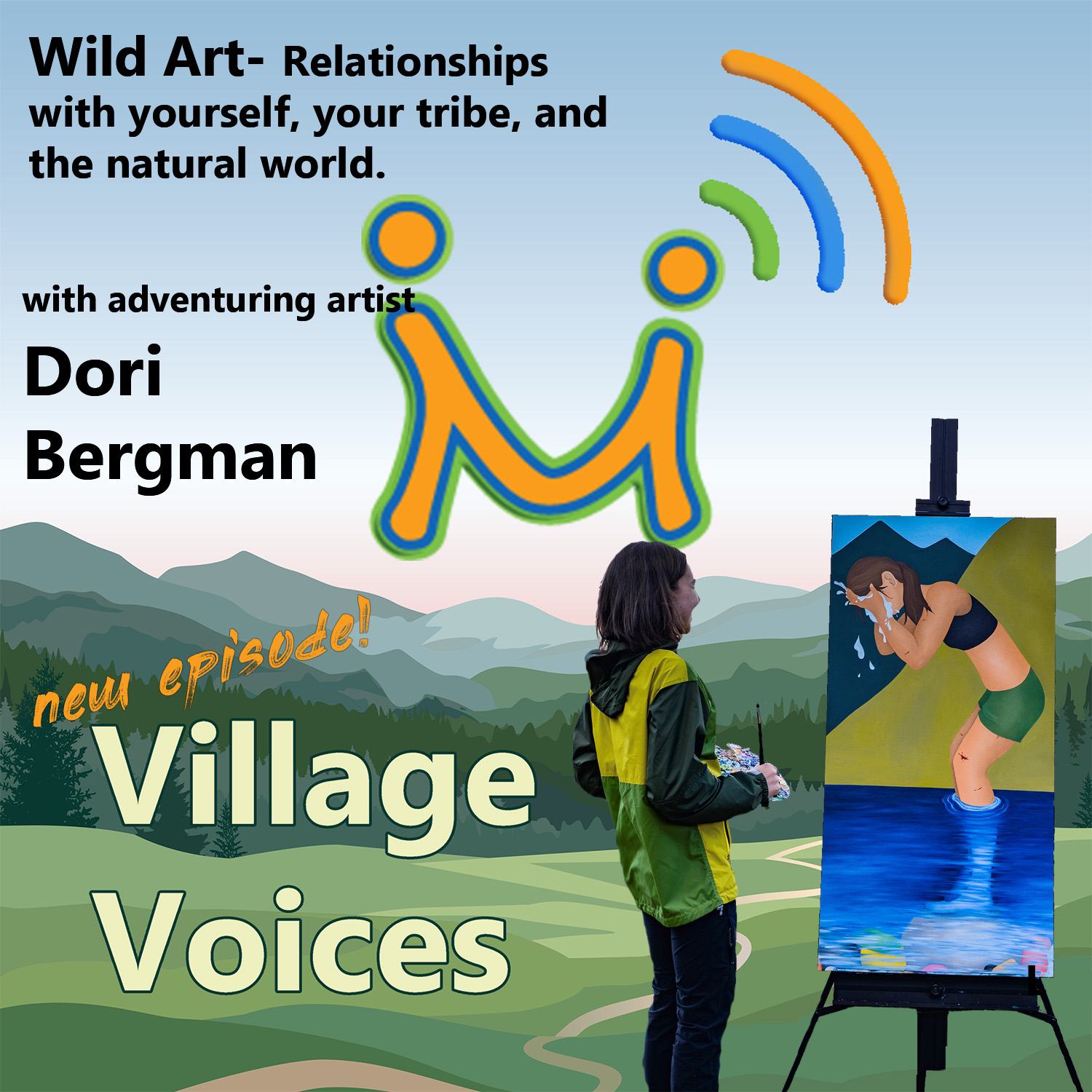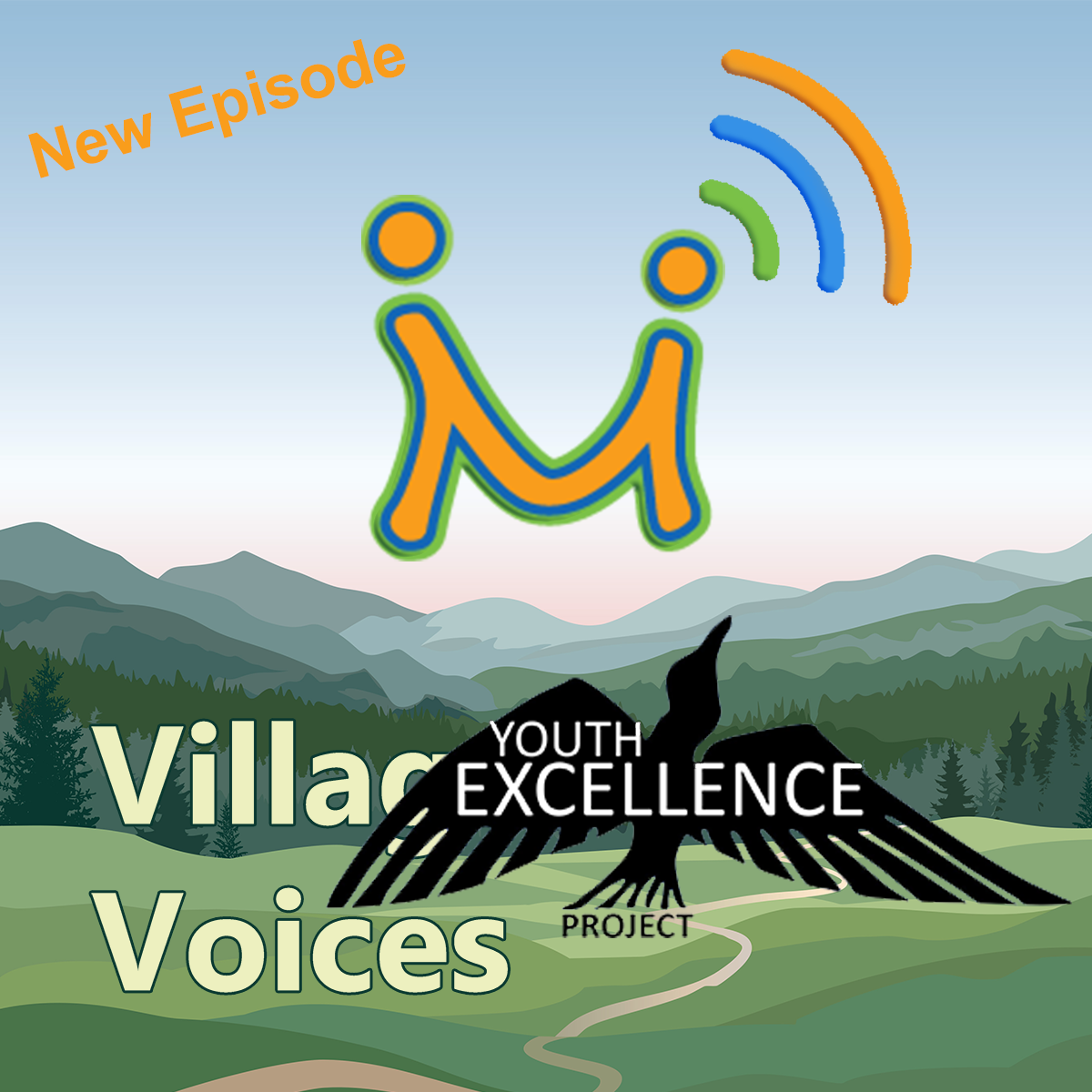Speaker 1- Jason Hyland 00:00:07 Who am I in the world where you in the world and perhaps most importantly, how do you and I connect as we in this world, hello everyone. And welcome to the Village Voices podcast, where we explore various topics that connect people with nature, create positive youth development outcomes or equitable communities and build conservation stewardship.
My name is Jay Hyland from Project Imo, and I'll be your host today. As we explore the intersection of adventurous learning and youth social growth, those questions we posed a moment ago, maybe some of the most critical questions, any human asks themselves, but they're really, really important to adolescents. Think back to those awkward years, as you started to gain independence, explore your internal sense of self forge, deeply connected relationships, built a tribe and negotiated the delicate balancing act. Growing from childhood into emerging Delta those years in between adolescents, they might have been as fraught with turmoil as they were filled with possibility each day, a slow construction of our new adult selves.
Speaker 1- Jay 00:01:19 In this episode, we're going to explore possibilities to help youth grow and develop in a positive social way through adventurous experience adventure education. That's a loaded term for summit conjures images of expeditions into the mountains, muddy boots, slogging weirdly a past the crumbles on the way to a remote summit for others. That may be the adrenaline fear and joy sailing through the air on a zip-line with the trees of a ropes course, maybe some envision the edge of a paddle breaking the waterline glistening in the sun, as they canoe along the slow moving river. And the wilderness defining adventure is even more challenging. Living it for some in venture may be a walk in the woods or even a simple day in the park. Whatever the adventure may be. There is something about sharing that experience, stepping us out of our comfort zones, supporting each other and overcoming adversity that makes shared adventure really powerful.
Speaker 2- Shawn Moriarty 00:02:15 I'm probably 50 yards away from him. And, uh, as I make my tea, I look and there's a deer coming across the meadow heading right to the outhouse.
Speaker 1- Jay 00:02:26 Oh, I see where this is going.
That was Shawn Moriarty. Sean has been running youth camps across the U S for decades as an adventure educator. He's walked quite a few miles alongside of youth. He's also part of our Project Imo Village and the author of ropes of ecology, connecting people to nature, community and place. I asked Shawn how he had seen adventurous learning, provide adolescents a chance for positive group growth. He told me about a time many moons ago when he was working at a camp in Connecticut with a group of sophomores, from a residential high school in the region, they were participating in a weekend team building event.
Speaker 2- Shawn 00:03:00 We were kind of near the end of the first day, kind of, and the secondary is going to be a fairly short day. We're going to do some other stuff. And we were doing the wall, you know, the classic wooden wall, get everybody over. And we had done a whole bunch of prep stuff, you know, all day long. This was kind of be their peak thing and they're getting ready to do it. And I knew the next day we had some, some things that their teacher and I had worked on to kind of cap out that weekend. And, uh, they were just storming hard. And these girls, I guess, I guess they were freshmen, they were really storming hard. They'd known each other for a whole semester. And you know, so this was kind of a early spring retreat and, uh, sort of doing the wall and just storming like crazy.
Speaker 2- Shawn 00:03:43 And it was a really first big storm that they had and, um, and really getting into it. And some personal stuff was starting to edge into the comments, um, around previous stuff that I, I found out later talking to the teacher that had been going on at school. Yeah. Nothing, nothing horrible, no, no really, really drug or things, but just those slight little barbs that were, that were ratcheting relational aggression. And, uh, and I'm looking at the teacher and, uh, I just kind of look at him and could that look like I'm going to try something.
Speaker 2 - Shawn 00:04:17 And so I stopped the group and we come down, you know, they, they come back over away from the wall. We step away for a little bit. And, uh, I do a quick check-in, you know, the whole sums up, thumbs down some in the middle, you know, no, no words. I just want to get a quick, quick sense. And, uh, yeah, we got a lot of middles and a lot of downs, maybe one or two fingers thumbs up, you know, but, um, and, and everybody was just tense. Like you could see the body posturing and faces were kind of scowled. And even the teacher was kind of like, whoa, okay. Right. We're doing this being a residential school. I mean, they were used to having conflicts like this, that, because the kids all live together. But, um, and so I kind of put it out there to them and I, and I just said, you know, Hey, here's the deal.
Speaker 2 - Shawn 00:05:03 You're all together for the next three and a half years as, as a, as a grade because they stay together. Right. Right. And I said, if this is what the next three and a half years is gonna look like, you know, I think, and your teacher might agree that you're going to have some issues, you know? And, and you've got to go back to school on Monday and you have an opportunity here. You're going to be together for the rest of your high school careers. And, and I said, it, you know, if you can, if you read some work on how to communicate with each other and it's okay to argue, you know, I went through the whole conflict is not bad. And, and we started talking and I said, let's, let's just start over. Right. We're still gonna do the wall, but let's just start over. But let's start with talking about how, how you see other people in the group as being key to the success of this group. Not yourself. You don't get to talk about yourself. We can do that later tonight. Cause we had a closing thing going out to campfire. So we knew he had him again. And I just kinda threw it out there. I'm like, you, you can get a choice. You can either keep being like this or you can really try to create something, something better.
Speaker 1 - Jay 00:06:12 Shawn told me about how he used a symbolic object to help the group process, this new challenge in this process, the facilitator uses some item as a token. It doesn't have to be fancy. It could be a pine cone, a piece of string, a ball, or even a climbing carabiner. This token helps guide reflection and connect as a focus for sharing thoughts and emotions in a way that sometimes it's easier than just opening the group up to discussion. This token is often passed from person to person in the group, as they dive more deeply into some often heavy topics.
Speaker 2- Shawn 00:06:45 And I just let them go and it was quiet for a little bit. And then just watching them, we did that for about a half hour or so, and then we did the wall and they, they did great. Um, but the cool part was is that I was there full-time for another year and a half. And then part-time for a couple of years after that. So I actually got to work with this group up through their senior year. Um, and it was just neat to see when they came back that following me, they came back the following fall. Um, and just, and that was one of the first things we talked about and that kind of did it to say, so how's everybody doing? How are we doing? And it was just amazing to see these, these, these young women, um, just really have taken ownership of, of how they interacted with each other, how they talk with each other, how they interacted with other other grades, right. And, and, and even talking with the teacher, you know, they had definitely continued to storm a little bit, the rest of that semester and there was other stuff going on, but he said that, uh, that they were still always willing to have a conversation
Speaker 1 - Jay 00:07:48 We are going to hear a bit more from Sean and just a moment. But we'd like to take a few to extend our gratitude to a group of folks in our village, without whom we wouldn't be doing this here today, project emo wouldn't be where it is today without the generous support of pro bono partnership, their team of experts helped us incorporate and gain charitable 5 0 1 C3 status at every step of the way. The volunteers at pro bono partnership offered guidance and diligent counsel to help us grow in ways we never could have achieved on our own pro bono partnership is celebrating 25 years of providing free legal help to nonprofits in Connecticut, New York and New Jersey founded on the belief that strengthening nonprofits will make stronger communities. The partnership's mission is to provide nonprofits with the legal advice and educational resources. They need to build capacity, reduce risk, and enhance programming with confidence. The partnership services were never more critical than during the last two years when the global pandemic led to shifting requirements for nonprofits and a greater need for services within communities, the partnership and it's 1400 volunteer attorneys were there to help writing 38,000 hours of free legal assistance to nearly 900 nonprofits valued at $19 million in 2020. And our partnership is also a non-profit organization and your support is what makes their mission possible. Learn
[email protected].
Speaker 1 - Jay 00:09:28 Sometimes youth adventure programs give rise to amazing stories. Sometimes they're epic tales of overcoming adversity. Sometimes they're heartwarming yarns that speak to a group coming together and building lifelong relationships. Sometimes they involve deer in outhouses. I asked Shawn to recall a tale of such total silliness from an expedition trip.
Speaker 2- Shawn 00:09:50 Um, so, uh, we were in, I was in Washington state, uh, with a group of kids and we were staying in a somewhat back country and a couple of miles in, but, but very frequented campground, but, but pretty sparse, you know, pretty spread out there. Wasn't there wasn't a lot of amenities. There was a couple of outhouses and that kind of stuff. And I'd always get up early in the morning and, uh, to make tea and have my quiet time before all the campers woke up all eight of them and sitting there and this kid gets up and he goes, Hey, can I, can I go to the bathroom? I'm like, sure, dude, go. Right. So, and we on trips, we'd had a rating system for going to the bathroom in the back country.
Speaker 1 - Jay 00:10:30 Of course they did. Shawn told me the rather in-depth system that the youth built, where they would collect up to 20 points for various aspects of answering nature's call in the back country. That's pretty much Nirvana for youth teen boys. One of the more tasteful categories was view. If you could get a majestic view, you got big points. I suppose I can get on board with that. So off we go.
Speaker 2- Shawn 00:10:53 And so, and he's, he's gone about halfway down to the outhouse, turns around and comes back up and goes, Hey, can I leave the door open? And I'm like, sure, dude, it's a beautiful view. So he goes down and I'm sitting there making my tea and I'm like, I can see him. You know, the outhouse is the back of it's facing me and he goes down and he's so excited, right? Cause he's, he's the first one up. He's going to get this, he's going to get extra viewpoints, right. Because he's got the door open, he goes down there and he, he goes inside. I can see the door open. Right. And I'm, I'm, I'm probably 50 yards away from him. And, uh, as I am making my tea, I look, and there's a deer coming across the meadow, heading right to the outhouse.
Speaker 1- Jay 00:11:33 I see where this is going
Speaker 2- Shawn 00:11:34 And I'm watching an and in my head, I'm like, I could probably say something. I want to see where this goes. And it was a small, it wasn't like a buck or anything. You know, it was a fairly small deer and it goes, and it sticks. Its head into the outhouse. All I hear is the scream. The deer takes off. He comes tearing back up to me, kind of pulling his pants up as he goes and he gets up these, Hey, meanwhile, he's trying to explain two speeds, but I'm rolling on the ground laughing. And so he finally comes down like one or two of the other kids wake up, you see a couple of their heads pop out of various tents, you know, cause this kid's screaming. And so he catches his breath and he just looks at me. He goes, so do I get extra points for the deer comes back out. And it was just those moments where, you know, they were unfiltered, you know? And I think that that's such a unique thing, especially on expeditions when you're away and you know, you don't have this, the same societal, uh, restrictions or expectations. And uh, it's just, it was just nice to see these 13 year old boys and a number of them went on to be counselors at that camp. Um, and so yeah, it was just really neat. It has this funny little moments where humor happens
Speaker 1- Jay 00:12:53 Once we were done regaling each other with stories of the silliness of wildlife and nature's call on trips, Sean and I explored the possibilities of adventurous learning to help youth regulate emotion. I asked him for some of his insights about them regulating emotions through what can be quite intentionally challenging experiences. One of the most powerful aspects of adventurous learning is that these experiences can invite us out of our comfort zones and into a space where we can grow and adapt to new circumstances. As we overcome adversity. Sometimes this is referred to as the stretch zone, the very nature of this process and dynamics of group interactions can sometimes lead to some pretty intense emotions. And that's exactly the point I asked Shawn to share with me some of the ways he'd seen youth regulate and properly express, what can sometimes be less than productive emotions during his programs?
Speaker 2 - Shawn 00:13:46 I think one thing I've always tried to build into programs is giving kids a way out and it's just, Hey, if you need a break, step off to the side. Yeah, no biggie, you know, if you need a break, just let me know. Or, you know, I, I tried to in a lot of team building programs when I got older, um, was to have someone whose job was the recorder, right. And their job was I give him a note pad and a piece of paper, you know, um, and their job was just to take notes right. And to be objective as possible. Um, and but, but allowing, I think allowing emotions to be present in, in team-building because they're real, you know, so often in school or in work, um, you know, we're kind of taught the unwritten rule is you don't bring your emotions unless it's enthusiasm or, you know, nose to the grindstone or, or whatever you don't, you don't bring those emotions to work if you're having a crappy day, have it on your own time.
Um, but with, with experiential education, it's very much part of it. And I think that, you know, the whole, you have your, you know, the, the, the safety zone, the growth zone and the panic zone, you know, and, and being comfortable, uh, comfort zone. Um, and I think if sometimes if you can guide the kids rather than kind of popcorning back and forth from comfort zone to, to growth zone, to fear zone, panic zone, rather than popcorning back and forth, if we can guide them kind of in a spiral, you know, where you, where you keep going, you know, into comfort out into the growth zone. And maybe that, that circle, that spiral was a little farther out into the panic zone. Um, but I, I find it, you can slowly and gradually, if you have the time to slowly expand the, the ellipse of that, that circle, right. Going out, going out of your comfort zone, into earnings zone, um, it allows them to, to regulate, right. It's not a, uh, all of a sudden we have no food.
Speaker 1 - Jay 00:15:36 Yes. We're, we're easing, easing into it
Speaker 2 - Shawn 00:15:38 Or I've taken away everybody's I blindfolded everybody and made half of the mute. Right. You know? Um, and so by, by giving them, you know, unless, unless I very specifically say, Hey, this activity is going to have some surprises in it. Right. Um, letting them know what the consequences are ahead of time, because I think that very few people truly like surprises, especially if it's gonna make them look bad. Yeah. But if we can help them and give them some of those tools, you know, that's why I like the things like, you know, the, the, the hold up your fingers for, um, you know, how's everybody feeling or the thumbs up thumbs down, um, any number of those, those check-in tools. It allows kids an opportunity and a facilitator to kind of gauge where everybody's going. And I think, you know, imagine if that was done in class at school, if teachers could take the time to the beginning of the class, Hey, let's check in how's everybody doing today.
Right. You know, I get to do that at summer camp sometimes when my staff is, if they have that morning check-in or an afternoon check-in, um, and just kind of get a sense, Hey, how's how are things going? That was a rough day. Yeah. You know, that's, let's talk about it. Um, and it's hard because a lot of folks are not ready for that, you know, especially the, the, the college stuff. And it's not their fault because we're not taught that unless you really dig into it, unless you come from a family that, that really handles emotions well, um, or you're lucky enough to be in a school program or have a mentor, or have, you know, a health class that might deal with personal health regulation and emotional regulation. We don't get that, you know, and we don't see that in movies or TV shows or books or whatever, you know, we S we see a lot of snide comments and put downs that, that gets the laugh track. Right. Um, and, and it, it, you don't see the real personal how to, how to deal with stuff.
Speaker 1 - Jay 00:17:26 What other things do you have to share about social, emotional learning in your adventure?
Speaker 2 - Shawn 00:17:31 I think just, uh, a couple of things. One is, is the acknowledgement of process, right? And because it's such an integral part, whether it's learning how to tie a knot, cause you're going to then repel off of it later, or, or build a shelter, um, or whether it's it starting with, uh, a couple mile hike and then going up to a week long trip, or whether it's, you know, starting off a, a team-building program with a, with a, a group juggle and going to something much, much more difficult on along during the day or a week or a month, however long this semester, if it's a school program, but recognizing that, that life happens in a process and that there's, there's there's yes. There might be some times when there is a black and white, you know, yes or no, or right. Or wrong in something, but oftentimes there's those nuances.
Speaker 2 - Shawn 00:18:23 And I think that, um, you know, whatever the, whatever the context is is that there's always opportunity to get better, and that could be better in a skill. It could be better in your emotional regulation. It could be better in, in how you and I communicate. Um, and how you and I plan a trip, um, on, on what risks a group is able to take, but it's that, it's that continual process. And, you know, there's, there's that saying, you know, practice makes perfect, which is a lovely sentiment, right? Um, uh, what I like better is a folk musician on the Cape Cape Cod named Dave Roth, not David Lee Roth, but a different David Roth. He has a song it's called practice makes progress. And I always liked that idea. And I think it fits in with experiential education and, and that, you know, you're going to have good days and bad days and acknowledging that and acknowledging kind of the realness of life.
Speaker 2- Shawn 00:19:19 And, and, and I remember the first time I ever did a trapeze jump, uh, when I was getting trained to do ropes courses, I sat on that platform for what seemed like hours, right. And I knew it was safe, psychologically safe. I knew physics wise, it was safe. Um, but just acknowledging the emotions that were there in the fear and, and the excitement and all those kinds of things, because we don't get to do that very often in our, in our daily lives. I mean, um, you know, you always have to be cool, calm and collected. If, you know, if you're a leader of your boss, or if you don't want to let your boss see, or your, your teachers see that you're having a bad day, I'm sure. And all of those things. And I think that that experiential education and adventure education really allows us to work with it, the gooey, sticky, emotional stuff, you know, and even if, if you, as the facilitator having a crappy day, you know, you may have gotten it from the wrong side of the bed.
Your kid was a pain, getting them to school, um, you know, you and your significant other had a fight that morning, whatever it was, you know, you still, you still had your morning beverage on the car. Um, and now you've got to show up and be professional for this group, you know? Um, and, and even like, if you and I were facilitating a program, I could show up with all that baggage and I can say, Hey, Jason, I'm at like 50% right now. I need, I need 10 minutes to get my stuff together. Right. Um, kid, can you start the group and I'll come in and join. Um, you know, and if we have, if we've worked on a relationship and we kind of understand each other, then, then it's a no brainer, right. And it's not, not a tit for tat, you know, it's, it's that, you know, you're there for the other people.
Um, and I think that those, those interconnection skills are so much more important than those independent skills. Um, and realizing that, that we're going to go farther if all of us pitching on this and make and make it work. So, um, yeah, I think it's always a, you know, it's always an adventure and, you know, intentional use of the word, even from the facilitator standpoint, you know, I might have this great program, you know, designed and something could go wrong. The group might not be there yet. Yeah. And you have to adapt and you have to be able to flexible and, and being honest, you know, and dealing with frustrations and, and all of those things, um, and expectations. And so it adds that level of excitement, at least for me, that level. Yeah.
Speaker 1- Jay 00:21:35 So I think it's so much of it as we have to give, we have to give kids a space to practice those emotions. Um, because if we just another sit, sit in class all day, go to work all day, never have conflict, never storm in your relationships. Then when things do go wrong is as they invariably will we, we, we just, as people don't have the capacity for it, because it's not a skill we've practiced and emotional regulation, uh, to your point, and, and this ability to interact and engage with each other, having built a relationship, those are practice skills. And I think it's just so critical for kids to have those. And I just think you just listening to some of your examples, you know, the adventure, education's kind of really, uh, almost a perfect palette for that.
Speaker 2 - Shawn 00:22:25 Yeah. And I wish I wish we could do it more, you know, um, in all venues, I think that, you know, and I think, you know, team building, sometimes it gets a rap bad rap. Uh it's sometimes it's hard. You have two hours with a group, right. You didn't really get to accomplish in two hours. Um, and, and, you know, if it's done over time, multiple times, multiple sessions and built into the culture, um, of, of a company or an organization or a school, that's when you really, you know, start to develop some things and, and, uh, you know, give a good taste in a couple hours, you know, even, you know, uh, like you and our kitchen, that the fire building the other day. And, uh, you know, it's great if you can light a fire once, But, but, you know, imagine if we were trying to build fires in that rainstorm that came in that night, you know, um, all gave different, totally different experience. Right. Um, and I think that, that, that's the beauty of it. I can, I can do spiderweb a hundred times and every time it's going to be different. Yeah.
Speaker 1- Jay 00:23:28 So, Shawn, thank you so much. I really appreciate it. Um, my pleasure, any, uh, any final thoughts, any final words of wisdom you can, you can share with us in the village tonight?
Speaker 2 - Shawn 00:23:40 I think one of the best pieces of advice I ever got, uh, along the lines of facilitation is, um, and working with groups is, uh, don't be too attached to the way you think things should look. Um, cause the group oftentimes has a much better awareness of what they need. Yeah. Um, we, we just need to be able to hear what they're saying or not saying, um, and, and adapt accordingly and, and sometimes, um, throw at the whole plan and start over. Right. And try not to take it personally.
Speaker 1- Jay 00:24:10 the number of times I had to go back to the drawing board, mid, mid, mid program. Yup.
Speaker 2- Shawn 00:24:15 Yep. Yeah. Uh, Jay, thanks. This is fun.
Speaker 1- Jay 00:24:19 Yes. Thanks very much. So thank you very much. And we will definitely be chatting back soon.
Speaker 2 - Shawn 00:24:24 Sounds good. Bye bye. Bye.
Speaker 1 - Jay 00:24:31 That's it for this episode, villagers from everyone here at Project Imo, we'd like to thank you for taking this very first step on an exciting journey alongside of us. We hope you enjoyed this exploration of adventure, education and social, emotional learning. As much as we did, if you didn't enjoy it, consider subscribing to the podcast. If you really, really enjoyed it, hop on over to www.projectimo.org and consider supporting our charitable efforts as every episode of village voices, podcast, much like our youth programs is supported by listeners. Just like you
